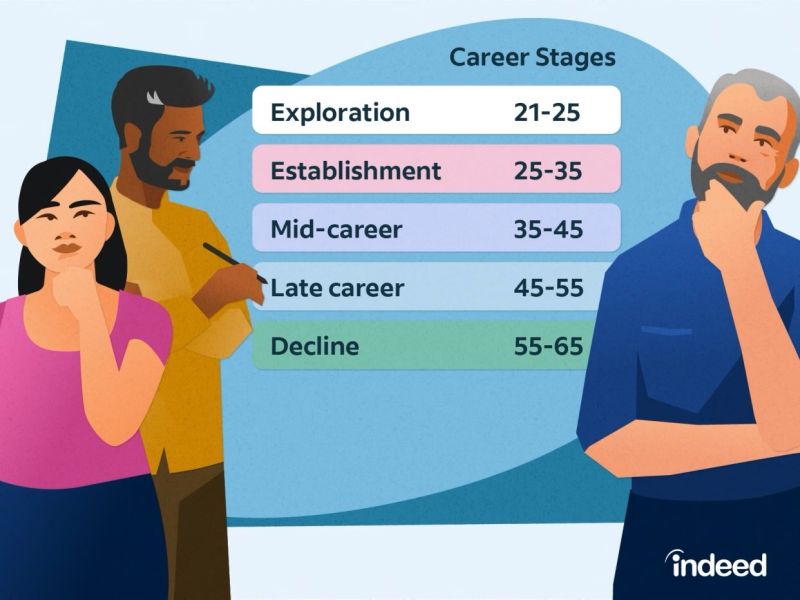Over-50s recruitment experts call out ageist career advice on jobs platform
While the latest tech trends and youthful energy often grab the spotlight, there’s a hidden treasure trove of knowledge and experience waiting to be tapped by recruitment agencies and hiring companies: older freelancers. This is despite mixed messaging which can be deemed ageist on jobs platforms, role descriptions and hiring practices.
It’s a common misconception that innovation is solely the domain of the young. Even recruitment platforms have been known to get it wrong. However, statistics tell a different story. Older entrepreneurs boast a significantly higher success rate, with 70% of businesses started by those over 50 still thriving after five years, according to Elizabeth Isele, Founder of the Global Institute for Experienced Entrepreneurship who offered her insights in Indeed’s 2024 report, Tomorrow’s World: The Workplace and Workforce of the Future.
Ironically, Indeed, which is one if not the biggest job sites, has reportedly shot itself in the foot recently by offending candidates aged 45 and over in another one of their reports.
Experts Calls Out Ageist Career Advice
A recent discovery in an Indeed report, has sparked outrage and a call to action against age discrimination. Lyndsey Simpson, Founder/CEO at 55Redefined Group and global expert on the value of the ageing population, has called out the platform for publishing what she sees as blatantly ageist and irresponsible content.
The reported offending “careers guide” labels those aged 45 as ‘late career’ and 55+ as in ‘decline.’ It goes so far as to suggest that those over 55 are likely ready to retire and should focus on socialising with friends and family.

Simpson, outraged by the outdated and patronising advice, highlights the stark contrast between Indeed’s messaging and the reality of today’s workforce. “At 55+, millions of people are just finding their stride in their chosen career or are re-skilling, coming back into the workforce having been caregivers, or starting new businesses,” she states.
Indeed’s guide, Simpson argues, perpetuates harmful stereotypes and undermines the potential of older workers. With life expectancy significantly increased since the traditional retirement age of 65 was established, it’s crucial for businesses and economies to adapt. The demand for experienced talent is high, with many companies actively seeking the ‘return on experience’ (ROE) that older workers offer.
Simpson’s 55/Redefined Jobs Board and Recruitment Advertising Campaigns are a testament to this demand, providing a platform for age-inclusive companies to connect with talented individuals over 50. She urges companies to embrace the value of older workers and rise up against outdated biases.
The incident serves as a stark reminder of the pervasive nature of age discrimination and the urgent need to challenge these outdated narratives. As Simpson aptly puts it, “We stand together against ageism.”
Victoria Tomlinson, FRSA, CEO of recruitment agency Next Up, who was one of the first to spot the Indeed report’s misrepresentation of workers over 45, has posted on LinkedIn that Indeed has since taken down the report. She said: “Thanks to the thousands who have shared, commented and emailed – Indeed has taken this article down.”
The Power of Experience
As we age, our brains continue to evolve. The communication between the right and left hemispheres strengthens, allowing for connections and insights that younger minds might miss, explains Isele. Older freelancers possess a wealth of life experience that can’t be replicated, offering a unique perspective on challenges and solutions.
A Multigenerational Workforce
“The multigenerational workforce has a distinct competitive advantage for so many reasons,” says Isele. “Right away, employers open up a stronger and broader pipeline of talent. You get a larger gene pool of ideas. Improve your workforce’s continuity and stability. And retain knowledge within that workforce,” she says.
By 2030, Isele notes there is expected to be 150 million more workers aged 55+. That’s roughly the same as the entire US working population. That means older workers will fill a quarter of jobs worldwide.
Embracing this shift and building multigenerational teams can give freelancers a distinct advantage. Collaboration between generations embraces a dynamic environment where knowledge flows freely, leading to enhanced productivity and innovation.
Imagine a team where experience meets fresh perspectives. Older freelancers offer stability, continuity, and a deep understanding of industry nuances. Yet like younger freelancers can bring new ideas, and call on younger co-workers when necessary for guidance on technological fluency. This blend creates a powerful synergy that benefits everyone involved.
Breaking Down Barriers
To truly leverage the power of a multigenerational workforce, it’s essential to challenge stereotypes and biases. Each generation has unique strengths, and by fostering mutual respect and understanding, we can unlock a wealth of potential.
As a freelancer, your success depends on continuous learning and adaptation. Embracing collaboration with freelancers of varying ages can provide invaluable insights, mentorship, and a broader network.
Key Takeaways:
- Older freelancers offer a unique perspective and valuable experience.
- Collaboration between generations fosters innovation and productivity.
- Embracing a multigenerational workforce can future-proof your freelance business.
- Challenge stereotypes and biases to unlock the full potential of collaboration.
What are your thoughts on the subject? Share your insights and professional opinions in our comments section.


